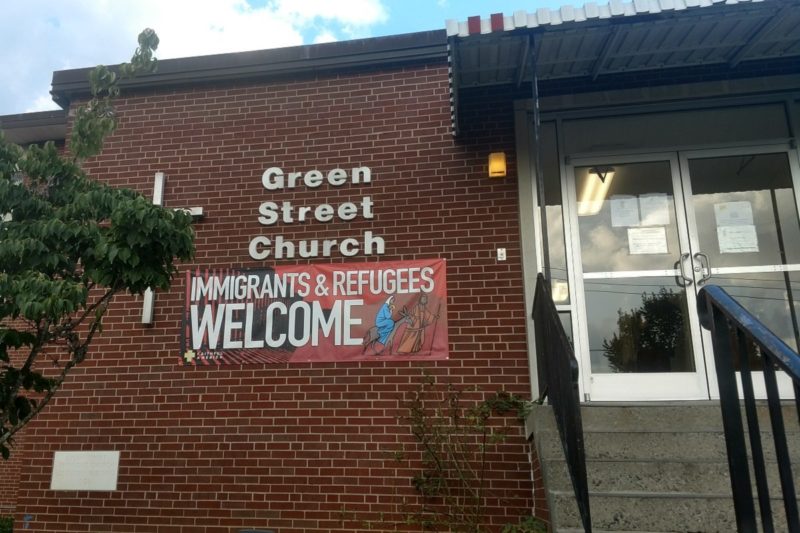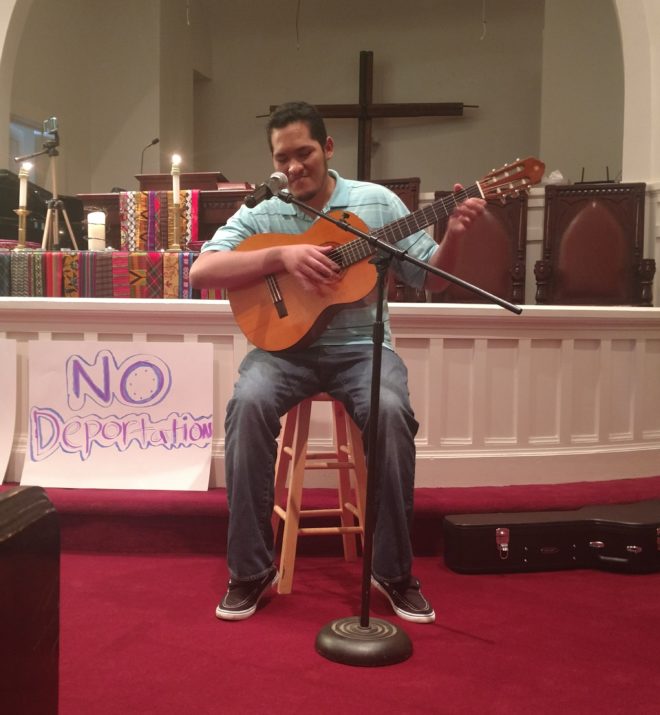‘Minerva Is Our Neighbor’: Communities Unite to Fight Deportation of North Carolina Mother
“I don’t really see this as a partisan issue; it’s a human rights issue, and we’re going to fight this [deportation] every step of the way.”

This is the second article in Rewire‘s two-part series on Minerva Cisneros Garcia. You can read the first part here.
In Winston-Salem, North Carolina, organizer Kim Porter sits next to Minerva Cisneros Garcia at her dining room table and pulls out a notebook littered with near-illegible scribbles. On this notebook is the game plan for the next week. The goal: Save Garcia from deportation.
In recent weeks, Garcia has been on the local news and in the local papers (the Winston-Salem Journal and the Chronicle). She has forced herself to become a public figure, despite having led an intentionally quiet life in Winston-Salem for 17 years so as not to bring unwanted attention to her status as an undocumented immigrant.
The more eyes on Garcia’s story and the more public uproar, the less willing Immigration and Customs Enforcement (ICE) may be to deport a person with no criminal record and a mixed-status family to support. At least that’s the hope, said Porter, who has been working closely with the Sanctuary City Coalition of Winston-Salem, which unsuccessfully pushed to get Winston-Salem declared a “sanctuary city“—a refuge for immigrants.
“Minerva just wants to work and take care of her kids. There is no reason why they should deport her,” said Porter, who is a member of a climate justice organization. “I don’t really see this as a partisan issue; it’s a human rights issue, and we’re going to fight this [deportation] every step of the way.”

Across the country, undocumented people and their attorneys are seeking support from their local communities as last-ditch efforts to avoid deportation under an administration that has taken a hardline stance on immigration. Garcia, who has received support from Winston-Salem organizers, activists, and members of various faith communities, is quickly running out of time. Her attorney has just seven days to get her a stay of deportation.
The Sanctuary City Coalition’s members were first alerted to Garcia’s case by the American Friends Service Committee (AFSC), a Quaker organization in nearby Greensboro. AFSC didn’t have the capacity to assist with Garcia’s case because it was supporting Juana Luz Tobar Ortega, a 45-year-old Guatemalan mother who took sanctuary in a Greensboro church last month after being ordered to leave the country in which she’s lived for 24 years.
Historically, media attention has been effective at shaming federal immigration agencies into releasing people from immigrant detention. Claudia Rueda, an undocumented immigration activist in Los Angeles detained by Border Patrol in May, was released from detention this month after a #FreeClaudia movement formed around her case. Her community protested, marched, and made phone calls to ICE and elected officials.
Even in Garcia’s much more conservative and GOP-led state of North Carolina, going public has proven effective. Wildin Acosta, a Central American asylum-seeking teen who was detained by ICE on his way to Riverside High School in Durham last year, made national headlines and spoke to media outlets about his case. Acosta was eventually released, and advocates attribute that in large part to the outpouring of community support he received from educators, organizers, and fellow students. A young woman who attended the same school as Acosta was quietly deported the year before, according to local residents.
Porter has been at community events for weeks, circulating an online petition directed at Atlanta ICE field office director Sean Gallagher, asking that he not deport Garcia. As of publication, the petition has received more than 12,000 signatures.
Winston-Salem’s Parkway United Church of Christ created a fundraising page for Garcia, to help with legal costs associated with fighting her deportation. In Porter’s notebook, there were notes about pushing to have elected officials and community members call ICE with a sample script asking that the federal immigration agency refrain from deporting Garcia. There were plans for a candlelight vigil, where local faith leaders would stand in solidarity with Garcia. All of these things have come to fruition. This is what community looks like, residents say.
Garcia said she has been somewhat taken aback by the community that has surrounded her and the media attention she has received. It is obviously a hard time personally, as she faces being taken away from her three children, including her 21-year old-son Eduardo, who is blind and depends on her for care.
Since the election, Garcia said it’s also been a confusing time.
“I think some Americans understand these [executive] orders impact people like me, but maybe they don’t care,” Garcia said, referring to Trump’s orders doubling down on immigration enforcement. “I don’t understand, because if they were born in Mexico and faced my situation, where my husband died and my blind son needed more opportunities, they would do what I did. They would look for the best for their kids.”
She has noticed a shift in how she is treated while out in the world, which is almost a stark contrast to the kindness exhibited by the near-strangers who have been fighting her deportation alongside her. It is a reality that doesn’t reflect the “humanitarian” spirit she believes the United States to have.
“When I used to go to the store, the people smiled at you. After this election, they don’t smile at you,” Garcia said. “They used to talk to the kids. Now they don’t do that. They’ve changed.”
“It’s because we look like this and we are from a different country, but we are just humans trying to make a better life.”
ICE asked Garcia to buy her own bus ticket back to Mexico. That bus departs on June 28, though she doesn’t have to leave the United States until June 30. She has just seven days to learn if her attorney can get her a stay of deportation. Or alternatively, to decide if she will board the bus or remain in the United States with a target on her back. Eduardo has Deferred Action for Childhood Arrivals, which grants him a reprieve from deportation and a work permit, renewable every two years as long as the program is in place. He is refusing to leave the country with his mother, though he has been fighting alongside her for weeks.
There is an interfaith coalition standing with Garcia and among the faith leaders who have spoken out on her behalf, there is a lot of talk about “loving your neighbor” and what that looks like. Craig Schaub, the pastor at Parkway United Church of Christ, addressed the media at a press conference for Garcia on Tuesday. There, he touched on a question that may be the crux of the immigration debate, which is to say, the normalization of denying people their humanity: Who is my neighbor?
If U.S. citizens who live, work, and eat alongside undocumented immigrants, whose children are friends with their children and who worship in the same places, do not see their undocumented community members who are being targeted as their neighbors, what can be done to bridge this divide? These questions are pressing, as the president’s anti-immigrant rhetoric has been effective at convincing the general public that to be undocumented is to be a criminal, thus justifying family separation and mass deportations.
“Minerva is our neighbor. This family is part of our family,” Schaub said at the Tuesday press conference. “When they are at risk of being broken apart, our community is broken as well.”
Also at the press conference, Liam Hooper said he knows what it’s like to “feel exiled” and he couldn’t put his head down at night if he didn’t stand with others who are being exiled, like Garcia. Hooper is the minister of Welcome and Beyond, a group for LGBTQ members that operates within Parkway United Church of Christ. As a trans man, Hooper said, the God he knows, knows nothing of documentation, gender identity, sexual orientation, or place of origin.
“My god cares about people, and I stand with Minerva and her family because it’s not what we say in private, but what we do in public,” Hooper said.
What the minister meant is that good intentions are no longer enough. It is not enough to shake your head at the news or to feel outraged watching your neighbors get dragged out of their homes by ICE. Now is the time for action, Hooper said. Even affected people like Garcia are being forced to act. For her, that means going public with her story.
Some vulnerable people being targeted for deportation prefer “hiding in the shadows,” but as organizers told Rewire last year, being “out” about your unauthorized status and connecting with a larger community can potentially make you safer.
“The fear is understandable because there are consequences, but it can be powerful,” said Jonathan Perez, an organizer with the Immigrant Youth Coalition. “If you’re undocumented and you don’t tell anyone and something happens to you, you don’t have a support network. If you’re undocumented and you’ve come out and connected to a support network, there are people who can mobilize around you if something happens.”
“Love Your Neighbor”
In an interview in his office last week, Schaub told Rewire “it is absolutely” the place of the church to help tell stories like Garcia’s. Admittedly, Schaub said, a majority of his church members are educated, white, middle-class, and U.S.-born, but his congregation has been on a yearlong journey to talk about systematic white supremacy, which the pastor said the immigration system is a product of. In discussions of “loving your neighbor,” Schaub said, it would be difficult not to address the system that attempts to “other” your neighbor to make detainment and deportation more palatable.

After the inauguration, Schaub and a coalition of interfaith leaders began having conversations and planning actions around, as Schaub calls him, “45’s” emerging immigration policies. This has included conducting “know your rights” workshops, working with local immigration attorneys, and meeting with ICE.
“We’re working to build this awareness in our congregation, but with that awareness, we have to make space for people like Minerva to be able to tell their own stories,” Schaub said. “We’re not perfect and we’ve wrestled with the response the faith community needs to have in this moment. It’s hard to know the most thoughtful way to respond to everything coming from 45 and the White House, but I can offer my understanding of the situation and offer actual facts to counter some of the narratives.”
The way that Winston-Salem’s interfaith coalition has banded together to fight the administration’s deportation and detainment policies is part of a larger, national trend in the faith community. Historically, organizations like the Lutheran Immigration and Refugee Service have spoken out against the U.S. immigration system, including issuing a report on how family detention is harmful to families. In the face of the Trump administration, however, faith leaders are being more proactive. Recently, Catholic bishops convened and pledged to pursue comprehensive immigration reform.
Schaub said he has been reading the “sacred texts” that are part of his tradition, realizing more and more that there isn’t much in these texts about “hot-button social issues.” What there is, he said, is a lot of writing about making room for those who are different; “there’s a lot about equity and loving your neighbor,” he said.
Faith leaders supporting Garcia uplifted this message again and again during a June 14 candlelight vigil at Green Street Church in Winston-Salem. Garcia squeezed her children close to her as attendees read a call to worship that included the line, “We gather with the faith and the hope that one day the desert will once again bloom with life; that one day the love we carry in our hearts will matter more than the documents we carry in our hands.”
